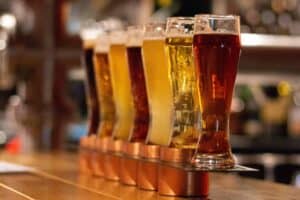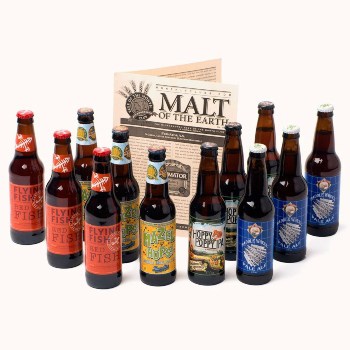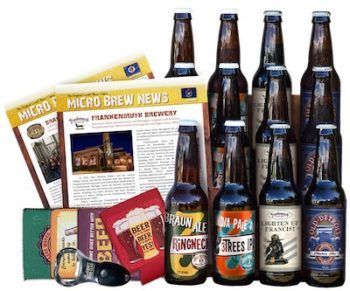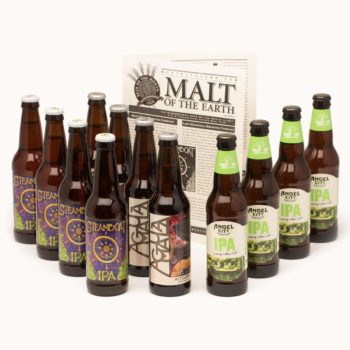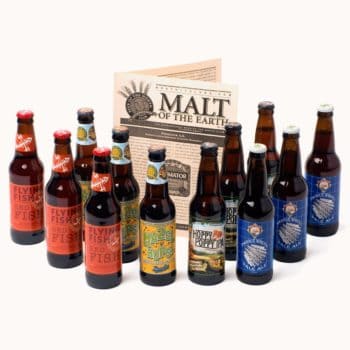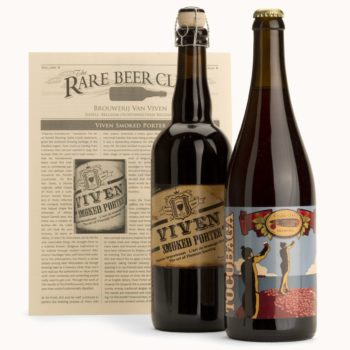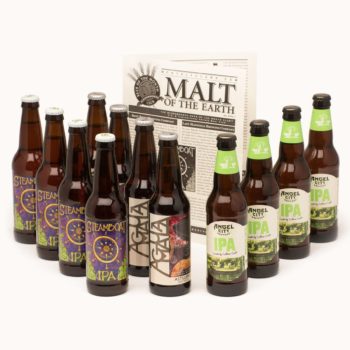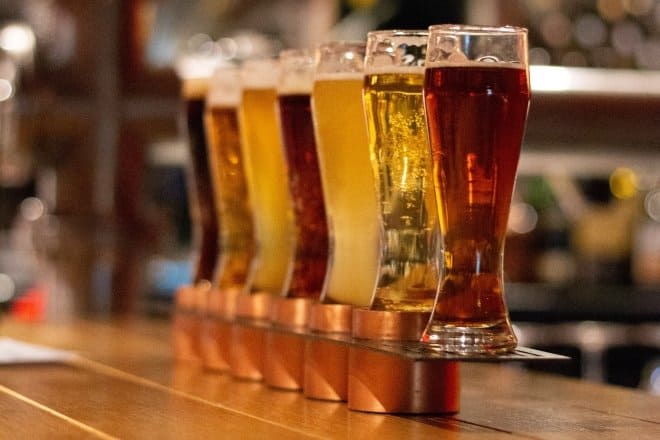
via: Unsplash / kyryll ushakov
If there's nothing you love more than trying the wild flavors of every new craft brew, then enrolling in a beer of the month club is a great choice for you!
After researching dozens of beer of the month clubs and reviewing four top competitors for best beer of the month club, we're confident that the U.S. Microbrewed Beer Club is the best overall.
With five unique beer club offerings that can make great hobbies for men, as well as an established history of happy subscribers and reliable shipping, it may be the perfect place to start your journey into craft beer clubs.
So without further ado, here are our top choices for the best beer of the month club offerings the internet has to offer. With options for every taste and budget, you're sure to find something to add to your list of hobbies!
- U.S. Microbrewed Beer Club - Best all-around club. This club has achieved a balance between affordability and variety.
- Craft Beer Club - A very close second, this club boasts that your stash will arrive fresh by keeping your beers at an optimal storage condition.
- Rare Beer Club - True to its name, this delivers the rarest beers, with some that are only brewed exclusively for this club, hence, the higher price point.
- Hop Heads Beer Club - This club offers slightly less variety but for the hop lovers or for those who want to try to get to the hoppier side, this is a great option.
U.S. Microbrewed Beer Club
The Best All-Around Beer Club
This club offers a fully customizable subscription at a very affordable price point, which is why it is also our budget pick.
Membership in the U.S. Microbrewed Beer Club is guaranteed to give you a variety of bottles to enjoy every month without breaking the bank. This club ranks first because it is one of the very first beer clubs, and given this history, the people behind U.S. Microbrewed Beer Club undoubtedly knows what they are doing. To prove that, they take pride in seasonal brews, because yes, they know that you need a refreshing beer in the summer and a warming one during winter.
Craft Beer Club
A Great Quality Beer Club
This club makes sure that you get new and exciting selections every month because they do not repeat any brewery for two years at a time.
Your stash will arrive fresh because the Craft Beer Club keeps your beers at an optimal storage condition, that's unparalleled quality. This is a very close second, only for the fact that the price point for this one is a bit on the higher side. However, they also give you the choice to customize your box so that you won't get something that you don't see yourself drinking. They also take their time to select beers from independent craft brewers who only have the highest standards, again, keeping up with their promise of quality.
The Hop Heads Beer Club
The Club Made for Bitter Beer Lovers
This club offers the best hop-centric brews which will definitely delight those who like their beers bitter than sweet and malty.
If you are really a beer fan, then you probably know by now if you prefer beers that are more on the hoppy side or not. Well, to tell you honestly, that's all you need to know before you get this box for yourself. Or well, you can also be a newbie to the bitter beers and still get this if you want an adventure for your taste buds. Whichever it is, we're sure you'll find this box pleasing.
Contents
Why You Should Trust Us
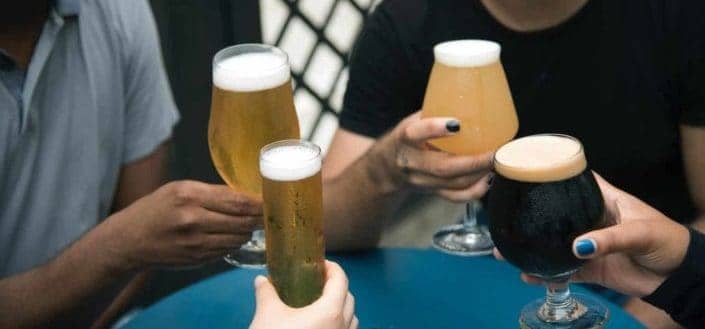
via: Unsplash / Elevate
In addition to our work as reviewers, your authors have spent over a decade working, drinking, and dining in craft beer cities across the United States. From the juicy, fresh IPAs of Portland, Oregon to dark and rich Chicago style stouts, we have a love for craft beer that we'll go to any length to satisfy.
But as any craft beer lover knows, you'll have to search far and wide to find the best brews, both domestic and international. In our quest to drink the coolest and most unique brews around, beer of the month clubs have exposed us to breweries and styles from around the world that we might never have otherwise discovered.
Who Should Get This
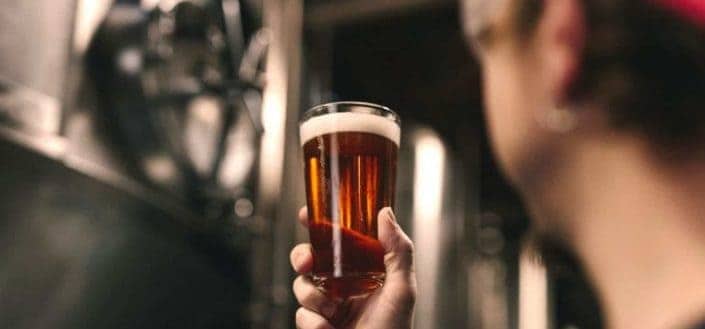
via: Unsplash / Elevate
Do you love beer? We sure do.
Not just the light yellow fizzy stuff -- that gets boring in a hurry!
If you're more enticed by the variety of flavors that different brewing methods and ingredients can impart to a beer, then a beer of the month club will be a hit in your household.
Sure, you could go to your local liquor store to pick out a beer or two here and there. And while that's great for a little while, eventually you'll crave more diversity and selection. When that's the case, a beer of the month club might be the best possible way to introduce yourself to new and hard-to-find beers from around the world.
How We Picked
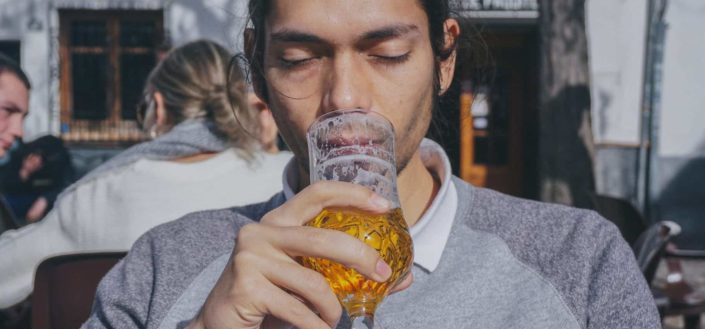
via: Unsplash / Hiki Liu
From the dozens of beer of the month clubs available for subscription today, we used the following criteria to separate the best of the best from all the rest:
1. Price
Just how much will you be paying for those beers, anyway? Every club on this list was chosen because its value compared favorably with the diversity and quantity of beer available.
2. Custom Club Pairings
For the complete newbie, any craft beer might be equally interesting. But soon enough, you'll develop specific tastes for beer styles you love, and ones you don't care for. That's why having the option to customize your beer selection is a key factor in what makes a great beer club.
3. # of Beers Per Shipment Box/Item
Closely related to price, how many new beers you receive per month was an important consideration in our reviews. We're most impressed by the beer of the month clubs that offer anywhere from 6 to 12 beers, so you can choose based on your drinking habits.
4. Diversity of Beers
Perhaps the most important criteria of all, beer clubs are only as good as the selection of beers that they offer. Wherever possible, we favor clubs that offer rare and unique offerings from microbreweries.
5. Membership
What are the terms of the membership? How easy is it to set one up, and cancel one if you're not a fan of it? All of the best clubs make it easy to get started, and easy to change or stop your membership if you need to.
4 Best Beer of the Month Clubs
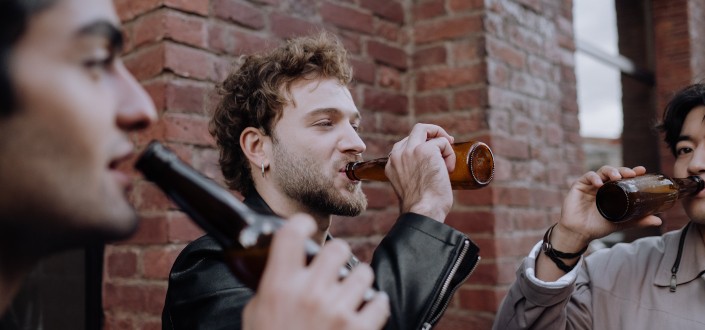
via: Pexels / cottonbro
Wait any longer and you'll only get thirstier! Let's jump right into the reviews.
1. Our Pick
U.S. Microbrewed Beer Club
The Best All-Around Beer Club
The U.S. Microbrewed Beer Club from the Microbrewed Beer of the Month Club selects only the best of rare brews that hardly ever make it out of their home state, ensuring that you'll always be tasting something totally new to you.
America's microbrewery scene has absolutely exploded in the past 20 years, growing to rival the best brewing countries in the world with its diverse selection of unique brews.
Every month, the U.S. Microbrewed beer club will deliver a dozen beers, in four different styles, from two small craft breweries as well as full tasting notes and brewery profiles.
Of all the beer of the month clubs we've reviewed, the U.S. Microbrewed club stands out as the clear winner thanks to its combination of affordability and selection. On top of that awesome combo, though, this club definitely has the most interesting beers, only offering brews that are almost impossible to find in stores. And no matter what you're looking for, you'll be able to customize your membership to suit your needs.
Started all the way back in 1994, the U.S. Microbrewed beer club is the OG of the beer of the month club world. Before most drinkers knew the difference between a lager and an ale, this club was already hard at work assembling the best and brightest minds in brewing to collaborate and expose beer lovers everywhere to the wide world of craft brewing.
One of our favorite things about this particular club is the attention that they give to seasonal brews. Their tasters have developed a fine intuition for pairing beers with changes in the weather, meaning that you'll always have a crisp and refreshing beer in the summer, and a rich and warming one come wintertime.
Alongside every shipment, you'll also get a copy of their Malt of the Earth newsletter, where they give in-depth profiles on the people and places that make these amazing beers a reality. All in all, this beer of the month club offers a total package for craft beer lovers that's not to be missed.
Pros
- Excellent price
- Awesome variety of hard-to-find beers
- Fully customizable membership options
Cons
- Not great for lovers of international beers
- Shipping can be expensive for buyers outside the U.S.
2. Our Runner Up
Craft Beer Club
A Great Quality Beer Club
Offering many of the same desirable traits as our top pick featured above, The Craft Beer Club also offers completely free shipping to anywhere within the contiguous United States.
A monthly subscription with no hidden costs, you'll receive a selection of 12 beers from around the United States, featuring three beers each from four different styles and two breweries.
Incredibly well-reviewed and featured in many prominent beer publications, The Craft Beer Club is an excellent club in many respects. But depending on where you live, it may end up being just a little bit more expensive than our top choice -- which is why we've listed it as our runner-up. We strongly recommend that when choosing between the two, you enter your shipping details to determine which club offers better pricing for where you live.
The Original Craft Beer Club pride themselves on only sourcing the freshest, tastiest brews from small production and independent brewers. You'll not find any big brand name beers here; 100% of the beers included in this club are sourced from independent craft breweries.
The Club also claims to offer the largest selection of any beer club, sourcing beers from nearly every state in its quest for the ultimate in variety. Combine that with their policy of not repeating any brewery for two years at a time, and you can be certain that you'll always be drinking something new and exciting when your shipment arrives.
Last but not least, The Club especially contracts their beers with each brewery to ensure maximum freshness. From the moment the beers are brewed and bottled or canned, they're kept in optimal storage conditions before arriving at your door.
Pros
- Huge selection of beers from across the U.S.
- Free shipping within the contiguous United States
- Freshness and variety guaranteed
Cons
- May be slightly more expensive than our top pick
- Not great for lovers of international beers
3. Also Great
The Rare Beer Club
The Most Exclusive Beer Club
Designed with the hardcore beer lover in mind, the Rare Beer Club offers only the most exclusive beers in the world.
From the same company as our number one pick, the Rare Beer Club will ship you two, four, or six 750 mL bottles of beers that you will almost never find in stores. Sourced from around the world, many of these rare beers are the "white whales" of the craft beer world.
Make no mistake, the Rare Beer Club is more expensive than any other option on this list. But honestly, that's to be expected whenever you're dealing with beer that is made in tiny batches, for special occasions, and often held in oak barrels to age for years before drinking.
Overall, the Rare Beer Club is best reserved for real beer fanatics but almost definitely isn't the right choice for beginners. For the beer drinker who's tried it all, however, no other club can beat this one's exclusive offerings.
Pros
- Only offers rare and exclusive beers
- Some beers you can't get anywhere else
- Perfect for experienced beer enthusiasts
Cons
- More expensive than other clubs
- Not great for beginners
4. Also Great
The Hop Heads Beer Club
A Great IPA Beer Club
Lovers of everything bitter, unite! The Hop Heads Beer Club from the Microbrewed Beer of the Month Club is every IPA lover's dream, offering hop-centric beers in every imaginable style.
Every month will bring you 12 bottles of hop-centric beer, with four bottles each of three brews from two different breweries. Bringing you the best of both domestic and international breweries' hoppy beers, it's a great option for people who love that fresh hop flavor.
In the beer world, there's usually a sharp divide between people who love their beer hoppy, and those who prefer a rich and sweet malt taste. The Hop Heads Beer Club is excellent for the former, offering a truly impressive selection of the most innovative bitter beers. With everything from dry hopping, to fresh hops, to new hop oil infusions, if it's bitter and green you'll find it in this box.
For nearly the same price as Microbrewed Beer of the Month Club's original offering (our top pick), you can enroll in this style-specific subscription and enjoy the finest IPAs, IPLs, hoppy red ales, pale ales, and session ales that the world's brewers have to offer. Just like their flagship subscription, the Hop Heads Club is fully customizable as well -- with no minimum subscription requirements, and added gifts for longer commitments.
While it may offer slightly less variety than our top two picks, the focused decisions of which beers to include each month more than make up for it. Only the best high-hopped beers make their way into the package, including only super-fresh beer that's better than what you'll find in stores.
Overall, making a decision on whether to go for this or our top pick is easy: How much do you love your hops? If a beer feels empty to you without that bitter kick, then go for the Hop Heads Club.
Pros
- Hyper-focused on only the hoppiest beers
- Cool selection of uncommon styles
- Very reasonably priced
Cons
- Not great for anyone who doesn't like bitter flavors
- Less variety than the original club
The Competition
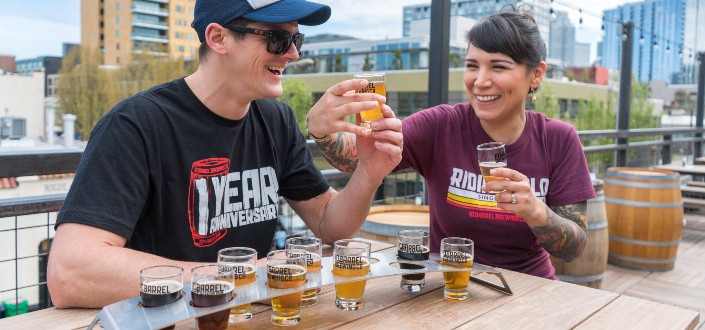
via: Unsplash / Elevate
Curious to see how all these clubs stack up against each other? Here's our take on the best parts of each:
| Club Option | Price | # of Beers Per Box | Diversity | Membership | Rating Score |
|---|---|---|---|---|---|
| Microbrewed Beer of the Month Club | 10/10 | 10/10 | 10/10 | 10/10 | 40/40 |
| Craft Beer Club | 9/10 | 10/10 | 10/10 | 10/10 | 39/40 |
| The Rare Beer Club | 10/10 | 9/10 | 10/10 | 10/10 | 39/40 |
| The Hop Heads Beer Club | 10/10 | 10/10 | 10/10 | 9/10 | 39/40 |
| Clubs Of America’s Beer Club | 9/10 | 10/10 | 10/10 | 10/10 | 39/40 |
| The International Beer Club | 10/10 | 10/10 | 9/10 | 9/10 | 38/40 |
Frequently Asked Beer of The Month Questions
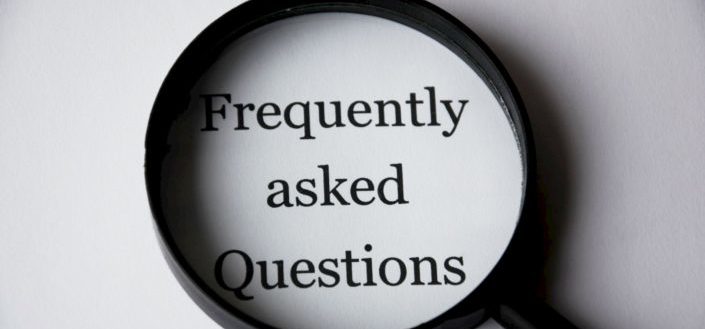
via: Pexels / Pixabay
Even though they've been around for over 20 years, beer of the month clubs is just now gaining big popularity. If you're totally new to the idea, take a look through these frequently asked questions.
1. What is a beer of the month club?
If you're wondering "what is a beer of the month club", the answer is quite straightforward: Every month, you'll be shipped a selection of fine craft brews from a variety of small-batch producers. Simple as that!
2. What is crafted beer?
Like any fine product, there's an art and a craft to making great beer. That's why the answer to what is crafted beer can be quite broad; but generally speaking, any beer that is made in small batches, to exacting specifications, can be considered a craft beer.
3. Can you order beer online?
Well, can you order just about anything online these days? Of course! Most states and counties allow it, so the answer to "can you order beer online" is almost always a yes.
4. Which Beer of The Month Club is best?
We've listed our favorites in the reviews above, but in the end, it will always come down to which club chooses beers that are most to your tastes. So don't be afraid to experiment with a few different clubs to find which one you really like best.
5. What beer of the month clubs are worth it?
There are a ton of craft beer subscriptions now, so we definitely recommend checking out our beer of the month club reviews to get a full picture of which ones are worth subscribing to.
6. What's the difference between a beer subscription vs Beer of the Month Club?
Essentially, there's no difference at all! The two terms are used interchangeably by almost everyone.
7. Is the Rare Beer Club worth it?
If you love collecting exotic, exquisite, and unique brews, then definitely! For more information, check out these rare beer club reviews.
8. Is the Craft Beer Club worth it?
We think it's definitely worth it, and give a full rundown of the pros and cons in these craft beer club reviews.
9. Are there beer clubs with specialty shipping?
Nearly every beer subscription service we know of offers beer clubs with specialty shipping. If you're looking for a specific delivery area, try reaching out to their customer service to confirm.
10. What other beer related gift options are there?
Anyone looking for beer gifts, especially craft beer gifts, will be spoiled for options. From glassware to coozies to t-shirts, hats, and stickers from hundreds of microbreweries, there are tons of beer related gift options available online.
11. What are some beer trivia questions?
You know, we have just the thing for that: This big list of beer trivia questions and answers!
Sources
- Effects of moderate beer consumption on health and disease: A consensus document, Science Direct
- Dietary Guidelines For Americans, Office of Disease Prevention and Health Promotion
More Of The Month Clubs to Choose From
Why stop at just beer? There are plenty of other craft food and beverage monthly clubs to choose from, like these awesome options:
- If vino is more your thing than malt, then a wine of the month club might be perfect for you.
- What's better with wine and beer than a fine cheese? Sign up for a cheese of the month club to start making some amazing pairings.
- Smoked pork belly is the way to many a man's heart (and quite a few ladies, as well!). Try out a bacon of the month club and you'll never miss out.


